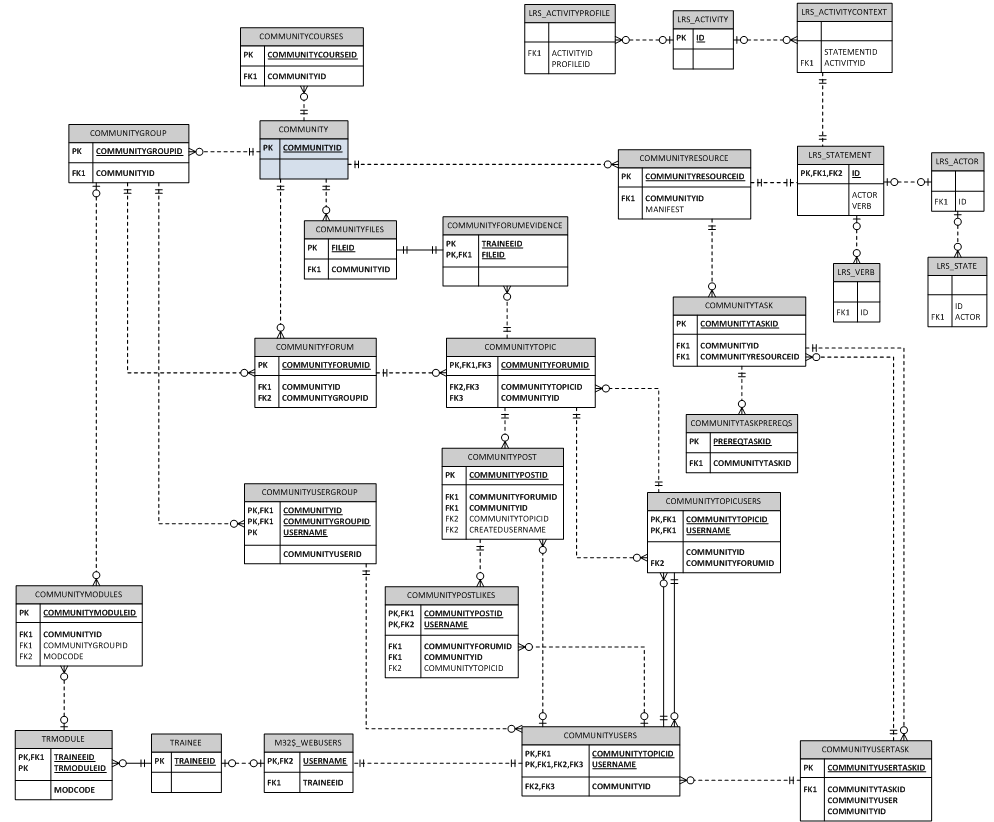Entity Relationships - Maytas Hub Communities (COMMUNITY)

Related Tables
| Table Name | Table Description | Primary Keys | Usually Joins From | Join Type | Joins On | Details |
|---|---|---|---|---|---|---|
| COMMUNITY | Community | COMMUNITYID | Stores basic details of each community. | |||
| COMMUNITYCOURSES | Community Courses | COMMUNITYCOURSEID | COMMUNITY | One to many | COMMUNITYID | Stores list of courses linked to each community. |
| COMMUNITYFILES | Community Files | FILEID | COMMUNITY | One to many | COMMUNITYID | Stores list of files linked to each community. |
| COMMUNITYFORUM | Community Forum | COMMUNITYFORUMID | COMMUNITY | One to many | COMMUNITYID | List of forum and group IDs for each community |
| COMMUNITYFORUMEVIDENCE | Community Forum Evidence | TRAINEEID, FILEID | COMMUNITYTOPIC | One to many | COMMUNITYTOPICID | List of evidence files for each community topic. |
| COMMUNITYGROUP | Community Group | COMMUNITYGROUPID | COMMUNITY | One to many | COMMUNITYID | List of groups for each community. |
| COMMUNITYMODULES | Community Modules | COMMUNITYMODULEID | COMMUNITYGROUP | One to many | COMMUNITYGROUPID | List of objectives assigned to each group. |
| COMMUNITYPOST | Community topic post | COMMUNITYPOSTID, COMMUNITYTOPICID | COMMUNITYTOPIC | One to many | COMMUNITYTOPICID | Details of posts in community topics. |
| COMMUNITYPOSTLIKES | Community post likes | COMMUNITYPOSTID, USERNAME | COMMUNITYPOST | One to many | COMMUNITYPOSTID | Likes for each post in a topic, by user. |
| COMMUNITYRESOURCE | Community Resource | COMMUNITYRESOURCEID | COMMUNITY | One to many | COMMUNITYID | Details of resources assigned to each community. |
| COMMUNITYTASK | Community Task | COMMUNITYTASKID | COMMUNITYRESOURCE | One to many | COMMUNITYRESOURCEID | Details of tasks assigned for each resource. |
| COMMUNITYTASKPREREQS | Community Task Pre-Requisites | PREREQTASKID | COMMUNITYTASK | One to many | COMMUNITYTASKID | List of pre-requisites for each task. |
| COMMUNITYTOPIC | Community Topic | COMMUNITYTOPICID, COMMUNITYFORUMID | COMMUNITYFORUM | One to many | COMMUNITYFORUMID | Details of topics in each forum. |
| COMMUNITYTOPICUSERS | Community Topic Users | COMMUNITYTOPICID, USERNAME | COMMUNITYTOPIC | Many to many | COMMUNITYTOPICID | List of users per topic. |
| COMMUNITYUSER | Community User | COMMUNITYID, USERNAME | COMMUNITY | Many to many | COMMUNITYID | Details of users per community. |
| COMMUNITYUSERGROUP | Community User Group | COMMUNITYGROUPID, USERNAME, COMMUNITYID | COMMUNITYGROUP | One to many | COMMUNITYGROUPID | List of users for each group. |
| COMMUNITYUSERTASK | Community User Task | COMMUNITYUSERTASKID | COMMUNITYTASK | Many to many | COMMUNITYTASKID | Intermediary between tasks and users. |
| LRS_STATEMENT | Resource Tracking Statement | ID | COMMUNITYRESOURCE | One to one | See details | Main details for tracking resource completion by community users. The join from COMMUNITYRESOURCE is complex as it checks LRS_STATEMENT.ID against IDs stored in COMMUNITYRESOURCE.MANIFEST (i.e. there is not a simple comparison between the two column values). |
| LRS_ACTIVITY | Resource Tracking Actions | ID | List of actions taken by a user regarding resource tracking. | |||
| LRS_ACTIVITYCONTEXT | Resource Tracking Activity Context | ACTIVITYID | LRS_ACTIVITY | One to many | ID = ACTIVITYID | Tracks the statements made for each action by a user. Also joins one-to-one with LRS_STATEMENT on LRS_STATEMENT.ID = LRS_ACTIVITYCONTEXT.STATEMENTID |
| LRS_ACTOR | Resource Tracking Actor | ID | LRS_STATEMENT | One to one | ACTOR = ID | Lists the user associated with a statement. |
| LRS_STATE | Resource Tracking State | ID | LRS_ACTOR | One to many | ID = ACTOR | Lists the states of an activity for each actor (e.g. if a user quits halfway through an action, a 'RESUME' state would be created). |
| LRS_VERB | Resource Tracking Verb | ID | LRS_STATEMENT | One to one | VERB = ID | Lookup for verbs used in statements. |
Many of the community tables can be joined directly back to COMMUNITY using COMMUNITYID, although only several of these are shown on the diagram.
A high-level explanation of the statement design behind the LRS tables can be found here.